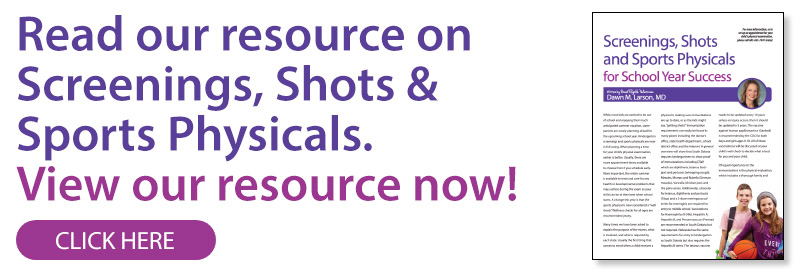Setting your kids up for success in school begins with making sure they’re healthy by getting them their necessary screenings, shots, and physicals. When your kids started the school year, you did everything necessary to get them ready to go back to class, such as buying school supplies, and getting them to the doctor for a well-check.
When summer rolls around, most kids are excited to be out of school and enjoying their much-anticipated summer vacation. If you’re like many parents, though, when that time comes, you begin planning for the next school year by scheduling your kids’ next round of doctor’s appointments.
Usually, when it comes to planning a time for your child’s physical examination and screening, earlier is better. If you put it off too long, it can be tricky to find an available appointment time.
Summer, especially early summer, is a great time to schedule appointments for kids, because more appointment times are available, and it gives you extra time to treat and care for any health or developmental problems that might surface during an appointment, that way your child can be at their best when school starts.
Well-Checks & Vaccinations
Physicals and screenings are commonly referred to as “well-checks,” which are an important part of kicking off a new school year right. Depending on your child’s age, vaccinations are also vital and should be administered before they begin classes.
It is not uncommon to be unsure what your state’s immunization requirements are. Requirements can easily be found in many places, including the doctor’s office, state health department, school district office, and the Internet.
A general overview will show that South Dakota requires kindergartners to show proof of immunizations including DTaP, which includes diphtheria, tetanus, pertussis, measles, mumps, rubella, varicella, and the polio series.
Before a child enters middle school, a booster for tetanus, diphtheria, pertussis, and a two-dose meningococcal series for meningitis are required. Vaccinations for Haemophilus B, Hepatitis A, Hepatitis B, and Pneumococcus are recommended in South Dakota but are not required. Nebraska has the same requirements for entry to kindergarten as South Dakota, but they also require the Hepatitis B series.
Additionally, the vaccine against human papilloma virus is recommended by the CDC for both boys and girls between the ages of nine and eighteen. If you’ve scheduled a well-check for your child, these vaccinations will be discussed by their doctor if they’re in need of them for school.
The Center for Disease Control has many helpful resources on vaccinations. Check out their website for more information!
Physicals & Screenings
Physical evaluations are of equal importance to vaccinations. Physicals are an overall examination of your child’s physical health, and they also include an analysis of family and personal medical history. This portion of a well-check can help detect life-threatening factors that might put your child at risk.
When sports physicals happen in larger group settings, this is the most overlooked part of a well-check. If you schedule a personal appointment with your child’s doctor, though, you are guaranteeing that they’ll have a thorough examination.
As a part of the physical exam, your child will undergo a developmental screening. During the developmental screening, their fine motor, gross motor, and language skills and social interaction abilities will be accessed.
All of those aspects of a child’s health are important for developing healthily and achieving success in school. If your child has any developmental issues, earlier detection can lead to earlier intervention that will better help them.
Additional screenings performed at all physicals include vision, vital signs such as blood pressure and heart rate, height, and weight. All of this information is used to determine if your child falls within the “normal” parameters of development. If they do not, it serves as a signal that a follow-up appointment is necessary.
An in-depth analysis of your child’s family’s health history is also done, which can help to catch any potential underlying health problems. These potential concerns can range from neurologic or respiratory issues to cardiac issues that could result in sudden death.
However, by undergoing a physical, any potential health concerns your child might have can likely be detected by their doctor, and then the necessary measures can be taken to protect their well being.
Ensuring a Successful Year
A yearly well-check is essential for your child’s health. Such visits are important for getting your child the care and attention they need, and it is an opportunity for your child’s physician to get to know them better and detect problems before they arise. The American Academy of Pediatrics (AAP) recommends a well-check every year for all children up to eighteen years of age. If you’re already planning ahead for next school year, make sure to schedule an appointment for your child and ensure they have a successful year!

